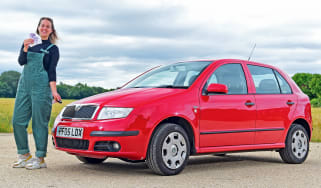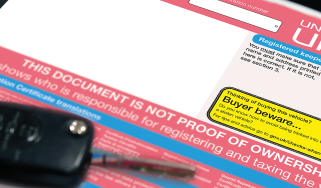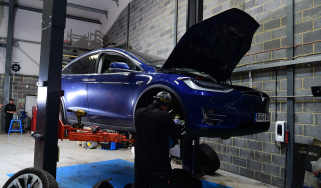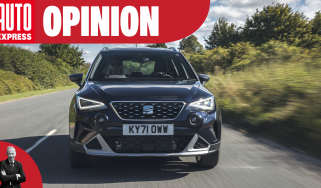Pre-registered cars: what to look for and how to buy one
We explore the pros and cons of picking a pre-reg car instead of buying a brand new car

There’s no doubting the ‘factory fresh’ appeal of a brand new car, and the thrill of being the first owner to get behind the wheel of an expensive new toy.
When looking around though, and especially if you prefer to visit dealerships instead of shopping online, it can be hard to ignore tempting deals offered on cars that are virtually new but already registered.
Franchised dealers regularly buy and register cars themselves because it allows them to meet sales targets imposed by the manufacturer they represent. Meeting those targets means dealers pocket worthwhile cash bonuses from their manufacturer. These bonuses outweigh cash lost on subsequently discounted prices when those same ‘pre-registered’ cars are sold on to customers.
Pros and cons of pre-registered cars
So-called pre-registered cars have long been a feature of the UK car market, and as well as having number plates they’ll often have a few miles on the clock too. For example, it could be they’ve used for sales demonstrations or test drives by potential new owners.
Pre-reg cars can offer significant savings over brand new models – typically you could be looking at between 5-15 per cent off the list price. They're also available quickly, there's no waiting lists like there can be for new cars, and most people won't be able to tell the difference between a pre-reg car and a brand new one. There are, of course, other factors to consider.
First of all, you need to be happy buying a car that could have quite a few miles on the clock, depending on how long it’s been at the dealership and what is has been used for. The term ‘delivery mileage’ is widely used, but it can mean anything from 2-3 miles on the clock to as many as 200 miles.
Choosing a pre-reg over a brand-new motor means also you’ll be limited in spec, because dealers tend to order popular versions that they can sell on easily. You’ll also have to be happy that you’re on the V5C document as the second registered keeper, after the dealer.
Most importantly perhaps, financing a pre-reg car can often work out more expensive than financing a new one.
Is pre-reg cheaper than new?
If you’re buying outright, then pre-reg or nearly new cars are cheaper than new – typically by five to 15 per cent. But if you use finance, then the discounted retail price doesn’t always translate to cheaper monthly payments.
New cars can be offered with interest rates as low as zero per cent APR, and typically sit at around five per cent. Pre-reg cars usually come with far higher APRs, and when you couple this with the fact that dealers don’t tend to offer deposit contributions with pre-reg cars, it can sometimes be even cheaper to buy brand new.
Sue Robinson, director of the National Franchised Dealers Association, told us: “Finance deals can be more or less attractive depending on different manufacturers and models of cars, regardless of whether the vehicle is new or nearly new.
“We advise consumers to look at what’s on offer and compare both new and nearly new cars to ensure that they find the best deal available and the vehicle most suited to their driving habits and needs.”
What to look out for
When looking at a pre-reg car, research the model in question. If it’s about to be replaced or facelifted, you could use this information to haggle over the price. Also ensure you receive the new keeper supplement section of its V5C logbook, as well as the sales receipt, when the dealer sends off its section of the logbook to the Driver and Vehicle Licensing Agency (DVLA).
It’s also a good idea to take out GAP (Guaranteed Asset Protection) insurance if buying nearly new. That’s because if a brand-new car is written off in the first year, insurers will typically pay out its as-new list price – but they will require you to be the first registered keeper before they do this. As you’ll be the second registered keeper of a nearly new car, your insurer will most likely pay out the car’s market value before the accident. A GAP policy will make up any potential shortfall between this amount and what you owe the finance company.
Also bear in mind that manufacturer warranties start running from the moment a car is registered. This isn’t much of an issue if this was a couple of weeks before you buy the car, but if it’s already missing six months of its guarantee, then this is something to consider.
What about ex-demonstrators?
Lumped in with pre-reg cars are ex-demonstrators, used by dealers to show off certain models to customers. These will have covered more miles than a pre-reg car and may have had a relatively hard life in a short period of time, but they make for attractive deals.
On the other hand, ex-demos can be laden with options and features designed to tempt buyers into upgrading their car when placing an order.
If you’re considering an ex-demo car, give it a full inspection for any scuffs or wear, inside and out. It’s also a good idea to look out for any damage underneath the car, as well as checking its alloy wheels for signs of kerbing. If there are any issues, point them out to the dealer and use them to haggle the price down, or have it in writing that these defects will be repaired before you collect the car. Be sure to inspect these repairs carefully to ensure a proper job has been carried out.
What about new cars from stock?
While pre-reg cars have been registered you will also see cars advertised as 'new from stock'. This basically means that the car is unregistered and hasn't been driven on public roads but has been built and is available for a fast delivery. As a buyer, you lose the ability to spec your car but otherwise the vehicle you'll be getting will be brand new. It should also be subject to a healthy discount over a brand new model that you order and wait for, as well.
Our dealer network has 1,000s of great value new cars in stock and available now right across the UK. Find your new car…
Find a car with the experts











